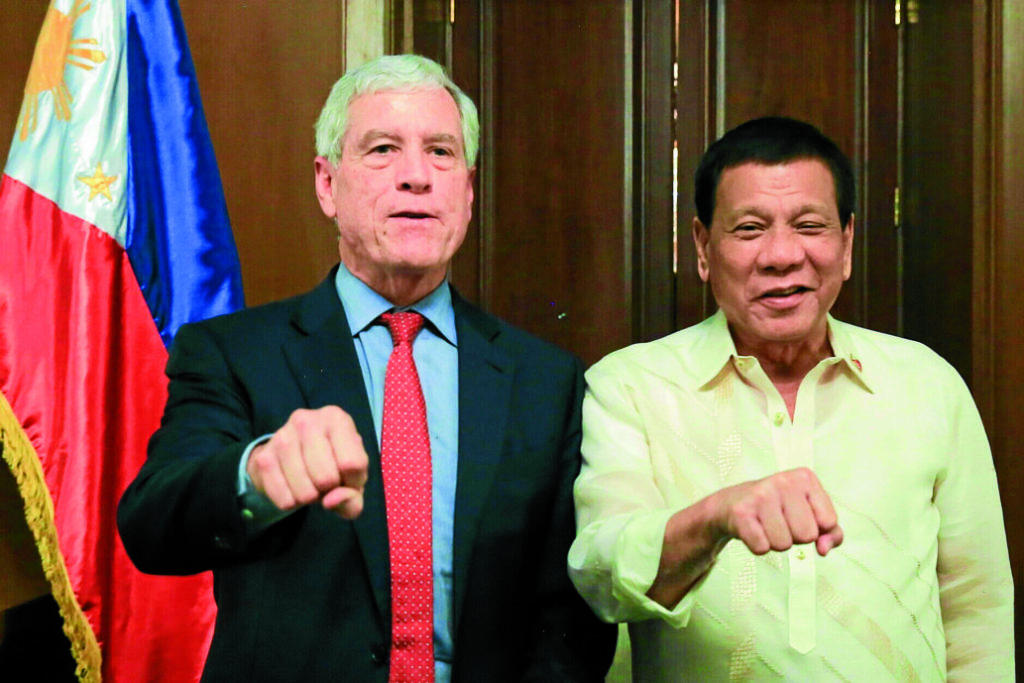Aussie spy chief’s fist pose draws flak

SIGNATURE GESTURE President Duterte and Director General Nicolas Peter Warner of the Australian Secret Intelligence Service pose for photographers during their meeting inMalacañang. —MALACAÑANG PHOTO
Is the Australian spy chief a DDS member?
DDS refers to the Die-hard Duterte Supporters.
Malacañang on Thursday defended Australia’s intelligence service chief Nicolas Warner after he got into trouble for posing with a clenched fist beside President Duterte.
Warner, director general of the Australian Secret Intelligence Service, has drawn flak for using President Duterte’s signature hand gesture.
The President used the clenched-fist pose throughout his 2016 presidential campaign during which he pledged to kill thousands of criminals.
Mr. Duterte’s ferocious 14-month-old campaign against narcotics has seen thousands of drug suspects killed, many in what critics say are suspicious circumstances.
Nothing political
Presidential spokesperson Ernesto Abella said there was nothing political in the gesture.
“I was there when the photo was taken. It was done in a lighthearted manner. It wasn’t meant to be in any way political. It was just a warming of relationships,” Abella said.
Malacañang released a copy of the photo to the media after Warner’s Aug. 22 courtesy call on Mr. Duterte in Manila.
A member of the Australian Parliament, Anthony Byrne, described the photo as “completely inappropriate for the head of one [of] our most important intelligent services to be in.”
Extrajudicial killings
The Australian foreign minister, Julie Bishop, has expressed concern about extrajudicial killings in the Philippines.
Other international and human rights groups have also condemned the killings that marked the Duterte administration’s antidrug campaign.
Warner is not the first foreign official to do Mr. Duterte’s signature gesture with him.
Japanese Prime Minister Shinzo Abe struck the same pose when he and Mr. Duterte met in Tokyo last year.
Australia also defended Warner.
Duterte request
Foreign Minister Bishop said that Warner was complying with a request from Mr. Duterte and that the image did not weaken Canberra’s criticism of the President’s war on drugs.
“On both occasions that I’ve met with President Duterte I’ve raised the issue of human rights and the extrajudicial killings,” Bishop told reporters in Perth in Western Australia.
Amnesty International said Australia must do more to try and curtail the Philippines’ firebrand leader.
“Australia is sending mixed messages amid an incredible spike in killings of the Philippines’ poorest people,” said Michael Hayworth, a human rights campaigner of Amnesty International.
“Australia must condemn in the strongest terms the killings by Philippine police of people without trial,” Hayworth said.
Since Mr. Duterte took office, more than 3,500 people have been killed in what the Philippine National Police says were gunfights with drug suspects who had resisted arrests.
The PNP says some 2,000 more people were killed in other, drug-related violence that it denies involvement in. Human rights advocates, however, say the death toll could be far higher than police say. —REPORTS FROM LEILA B. SALAVERRIA AND THE WIRES